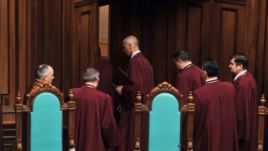Consitutional Court once again obliges

The Constitutional Court has once again overturned a previous judgement and, in response from the Party of the Regions submission, stated that the Kyiv council and mayoral elections can be delayed until well after the next scheduled presidential elections
On Thursday Ukraine’s Constitutional Court issued a judgement stating that the Mayoral and council elections in Kyiv, as well as the council elections in Ternopil, can be delayed until October 2015. This means that there will be no chance of ousting the highly unpopular Kyiv Administration and its pro-President head Oleksandr Popov - until after the Presidential elections. As reported earlier, all efforts in parliament to set a date for these elections have been thwarted by the ruling Party of the Regions which claimed that the issue should be considered by the Constitutional Court. The latter’s judgement is therefore music to its ears.
The Court explained the fact that this present judgement differs from its previous judgement as being because the latter judgement was before the Law on Amendments to the Constitution on the holding of regular parliamentary, presidential and local elections came into force.
According to the Deputy Head of the Court, Serhiy Vinokurov, the Court deemed that the question of how often elections to state bodies and bodies of local self-government should be sensible and aimed at ensuring optimal succession and stability in the formation of the representative bodies”.
The Court thus asserts that it is admissible to (considerably) extend the term of the present Administration in order to have all elections at one time, i.e. October 2015.
Yury Yakimenko from the authoritative Razumkov Centre told Radio Svoboda that the decision was “political rather than law-based”. The opposition Batkivshchyna party has asserted that the Constitutional Court has helped the ruling party to further usurp power.
Over the last three years the Constitutional Court has passed a number of judgements which have overturned its own previous (recent) judgements, some of them with serious ramifications for citizens’ rights. It has also persistently refused to consider issues which would certainly seem part of its scope, for example, the constitutionality or otherwise of the Law on State Language Policy which allows whole oblasts to effectively run their affairs totally without the use of Ukrainian, the only State language according to Ukraine’s Constitution.
Halya Coynash





